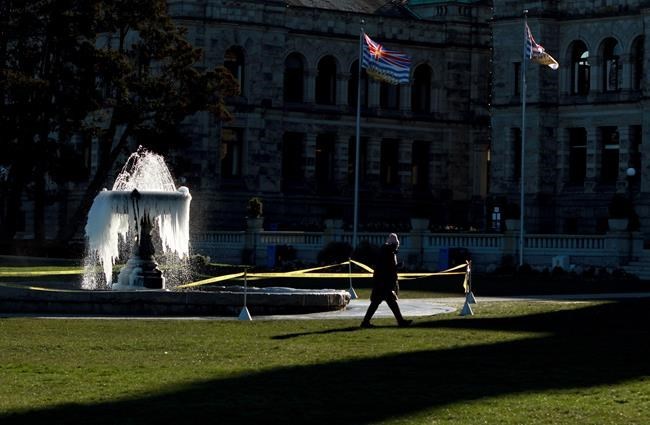Parts of British Columbia are being told to prepare for snow as a polar cold snap pushed east through the Prairies and into Ontario on Monday.
Environment and Climate Change Canada said moisture from a Pacific system will bring precipitation beginning late Tuesday to central and southern B.C., and the potential for snow or icy rain during this time "could pose a hazard to travel and outdoor activities."
Special weather statements are up for the southern part of the province, including Metro Vancouver and eastern Vancouver Island, that say snow or freezing rain are on the way by Tuesday.
Some areas saw some relief from the bitter temperatures, while others remained under a deep freeze.
Environment and Climate Change Canada issued an extreme cold weather warning for East Kootenay, Elk Valley and Yoho National Park, where a multi-day episode of frigid wind chills continues. The agency said the weather in these parts could feel like -40 C with the wind chill.
A beloved Calgary Zoo attraction had to be rescheduled Monday as the city continues to deal with freezing temperatures.
The zoo postponed the year's first penguin walk, where visitors watch as the birds waddle around the grounds. In a release it said the "walk is dependent on the birds' desire to walk as well as the weather."
The zoo added if temperatures dip below -25 C or the winds are too excessive, the walk will be cancelled.
Meanwhile, snow squall warnings have been posted for parts of southern Ontario with a band of lake-effect snow on the way.
In Toronto, where temperatures dipped to -12 C, warming centres reached capacity through the weekend as those experiencing homelessness packed in to rest and get something to eat.
Intense cold, ranging from -30 C to -45 C, carrying over from the weekend caused the Alberta Electric System Operator to issue another brief grid alert Monday after making similar warnings on Friday, Saturday and Sunday.
The operator said it ended the alert after more wind and solar power helped ease strain on the system, but urged people to continue to conserve power into the evening, as extremely cold temperatures continued to pose problems.
"We've gone for a period of the last few days where we had almost no wind and we were on very short supply, and that created additional challenges and additional stress on the grid," said operator spokesperson Leif Sollid.
"Now, we're starting to see more wind, which certainly does help us meet demand here across Alberta."
B.C.'s public power utility, BC Hydro, said the extreme cold drove peak hourly electricity demand to a record high on Friday night, reaching 11,300 megawatts.
The utility said on Sunday it sent about 200 megawatts of power to Alberta.
Extreme cold warnings are expected to remain in place for parts of Saskatchewan and Manitoba until Tuesday.
School divisions in Saskatchewan say the cold forced them to cancel bus services on Monday. Public and Catholic school divisions in Regina, and the Prairie Valley School Division outside the city, said the cancellations included bus trips planned for extracurricular activities.
Regina City Hall closed its doors after cold temperatures caused water pipes in the building to burst.
Environment and Climate Change Canada said an arctic air mass brought dangerously cold temperatures to most of Manitoba on Monday.
The town of Churchill was under a blizzard warning due to high winds. The weather agency said travel was expected to be "extremely hazardous due to reduced visibility."
Further north, Baker Lake, Coral Harbour and Naujaat in Nunavut were also under blizzard warnings where the weather agency said heavy and blowing snow could lead to zero visibility.
Overall, temperatures are forecast to be moderating in parts of British Columbia and Alberta after the deep freeze over the weekend broke numerous daily records.
Environment Canada said temperatures at Edmonton International Airport set a new daily low for both Jan. 13 and Jan. 14, reaching -45.3 C on Saturday.
Dozens of other temperature records were broken in Alberta, including in Strathmore at -36.8 C, which was just a notch colder than the record set in 1916 at -36.7 C.
The weather agency said despite somewhat warmer temperatures on the way for Alberta, daytime highs of -21 C are forecast for Edmonton on Monday.
This report by The Canadian Press was first published Jan. 15, 2024.
— By Brittany Hobson in Winnipeg.
The Canadian Press



